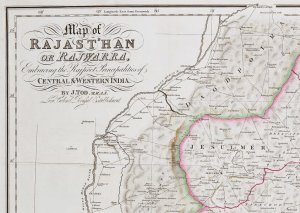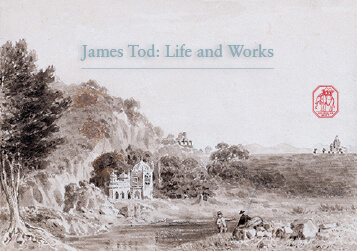James Tod: Life and Works
The Society remembered Lt-Col James Tod on the anniversary of his death, 18 November 1835. James Tod was one of the Society’s most famous early Fellows. He was elected a member in 1823 and was its first librarian and a major early benefactor. He gifted and later bequeathed to the Society most of his collection of Rajasthani manuscripts, documents, and artwork, as well as his draft translations of several Rajasthani epics. Today the Tod collection at the RAS remains perhaps the largest assemblage of Rajasthani literary and historical material anywhere in the world outside of India and is one of the Society’s most consulted archives.

The collection was amassed over the course of Tod’s nearly 24 years of continuous residence in India from his first arrival in late 1799, aged just 17, until his departure in early 1823. The lion’s share of this tenure was spent in Rajasthan (principally at Udaipur) and in neighbouring Gwalior. Tod initially established his footing in India as a cartographer, producing surveys of Mughal canal systems as well as the first western style map of Rajasthan. He then entered the diplomatic ranks, rising to become the first British Political Agent to the Western Rajput States (1818–22). The five Rajput-ruled kingdoms within his jurisdiction (Mewar, Marwar, Jaisalmer, Bundi, and Kotah) encompassed nearly three-quarters of the modern-day state of Rajasthan.

Although Tod never mastered any of India’s so-called ‘learned’ languages, such as Sanskrit, Prakrit or Persian, he developed a knack for spoken vernaculars, becoming fluent in two important languages of southern Rajasthan – Mewari and Hadauti – as well as the ‘Hindustani of Delhi’. He also had basic competences in Gujarati, Punjabi, and Magadhi. He delighted in using the common tropes of the vernacular as well as deploying the distinctive forms of cadence, alliteration, and onomatopoeia that, in part, characterize these languages. Interestingly, in time, these Indian speech practices came to inform his English expression, a trait he famously shared with his friend and colleague Col. James Skinner.
When Tod finally returned to the United Kingdom in early 1823, he settled in London, quickly married, and started a family. Nevertheless, he found that, after his long experience in India, he was no longer at home in England – remarking, for example, on the ‘peculiarity’ with which the ‘natives’ spoke English and choosing to spend as much time as possible on continental Europe, especially Italy. According to his obituary, he died on one of his return sojourns to London following ‘a fit of apoplexy while visiting his bankers on Lombard Street’, the circumstances of his death thereby affirming enduring aspects of the human condition.
The scholarly fruit of Tod’s career in India was his Annals and Antiquities of Rajast’han published in two volumes (1829–32) and his posthumously published Travels in Western India (1839). Tod’s Annals, the more well-known of his texts, defies easy categorization. It contains elements of historical narrative, ethnographic observation, translations and analysis of oral and literary epics, reflections on religious practices, personal memoir, and a trenchant critique of East India Company policy towards the region. Tod’s criticisms of Company rule in Rajasthan, in fact, contributed to his forced early retirement from Company service and a de facto prohibition against his ever returning to India.

Perhaps the most enduring contribution of Tod’s Annals is its bringing the vernacular historical literatures and popular oral epics of the region, most notably the Prithviraj raso, to the attention of a western audience in an early (if only ever incompletely realised) form of what might be called ‘ethno-history’. While Tod held tightly to 18th–century Scottish enlightenment notions of historical progress, he nevertheless felt that political institutions of each culture advanced according to their own unique trajectories, processes, and logics that were not easily comparable to those experienced in Europe. Even Tod’s use of the analogy of ‘feudalism’ to characterise Rajasthani political relations focused as much on the profound differences between the European and Rajasthani avatars than their similarities. With this in mind, Tod understood that the traditions of historical memory in Rajasthan would follow forms and practices that would seem unfamiliar to those recognized in the West but were not less insightful because of these differences.
As part of its bicentenary celebrations, the Society in conjunction with Yale University Press has published a fully restored edition of Tod’s Annals that is accompanied by a new explanatory Companion Volume. Although Tod’s text has remained in print almost continuously since its first publication, successive editors have sought to ‘improve’ it with various reworkings and interventions. The Society’s new edition returns the text to its original state so that the reader can more fully appreciate its intentions and expressive force on its own terms.
In addition, the Companion Volume helps the contemporary reader to better understand Tod’s now often misunderstood world view. It includes a Preface and contextualizing Introductory essay along with some 100,000 words of annotations in over 825 separate entries that the book designers have directly keyed to specific passages in Tod’s text. Moreover, the Companion Volume illustrates a rich density of visual material (including paintings, diagrams, and documents) drawn from the RAS Tod collection and other collections relating to Tod that throw new light on his administrative career, intellectual ambitions, and working practices. A glossary with concordance of spellings, bibliographies, index, and explanatory notes on such topics as the unusual Rajasthani system of dates make the Companion Volume an invaluable resource for anyone interested in the region.
Further information about the Society’s anniversary re-issue of Tod’s Annals can be found by clicking on the following link: TOD BLAD with reviews spreads LR.
Orders can be made through either of the following links.
For the Americas:
yalebooks.yale.edu/book/9780300270525/annals-and-antiquities-of-rajasthan
For the rest of the world:
yalebooks.co.uk/book/9780300270525/annals-and-antiquities-of-rajasthan
Dr Norbert Peabody, Royal Asiatic Society President, 22 November 2024

